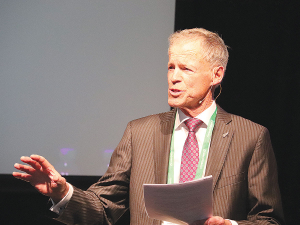NZ Catchment Groups Thrive with ‘Source to Sea’ Approach
The most successful catchment groups in NZ are those that have 'a source to sea' approach.
 Lockwood Smith believes NZ is missing out on producing climate change solutions because of our ban on gene editing.
Lockwood Smith believes NZ is missing out on producing climate change solutions because of our ban on gene editing.
A plea for New Zealand to embrace gene editing is being sounded by Sir Lockwood Smith.
Smith is a former NZ High Commissioner to London, Speaker of Parliament, trade minister and Massey University scientist.
He told the recent Federated Farmers annual conference that NZ, by holding out on gene editing, is missing an opportunity to deal with climate change and carbon emissions, and to improve pasture species.
Smith says gene editing is a safe process that simply involves slightly altering the best genes in a particular species of animal or plant.
Embracing gene editing is critically important to enable NZ to progress in key primary sector areas, Smith told the conference.
Opposition to gene editing “is based on ignorance, and I don’t mean that in an unkind way, I just mean there’s a lack of understanding.
“People are more fearful of wider genetic modification. This involves taking genes from one species and using them in another one… notably the toad/gene thing, which is the other end of gene technology and a track we don’t need to go down right now.”
Start gene editing now, Smith urged the conference. This is needed now because new pasture species are being researched and gene editing would make them much more efficient.
But it would need doing in the US as it’s banned in NZ. “Our primary industries are suffering financially as a result of this.”
Scientists in NZ must speak up, says Smith. And news media should not just cover people with colourful, flamboyant views, but also talk to respected scientists.
Asked about Smith’s views on gene editing, Agriculture Minister Damien O’Connor urged caution. He says big marketers of NZ meat and dairy told him recently in London that they don’t want products in any way genetically modified.
These companies say NZ has a market advantage in not having GMOs in food. But O’Connor doesn’t rule it out completely for the future, he said.
“Clearly gene editing is incredibly valuable… but we must ask, who are the consumers of our products and what are they looking for? Being non-GMO gives NZ an advantage now but will it in future and what are the trade offs?”
O’Connor says he’s not dismissing the technology but it needs a lot more work and discussion for a final decision.
Budou are being picked now in Bridge Pā, the most intense and exciting time of the year for the Greencollar team – and the harvest of the finest eating grapes is weeks earlier than expected.
The Real Estate Institute of New Zealand (REINZ) has released its latest rural property report, providing a detailed view of New Zealand’s rural real estate market for the 12 months ending December 2025.
Rural retailer Farmlands has released it's latest round of half-year results, labeling it as evidence that its five-year strategy is delivering on financial performance and better value for members.
OPINION: "We are back to where we were a year ago," according to a leading banking analyst in the UK, referring to US president Donald Trump's latest imposition of a global 10% tariff on all exports into the US.
DairyNZ says the Government’s proposed Resource Management Act reform needs further work to ensure it delivers on its intent.
Overseas Trade Minister Todd McClay says he's working constructively with the Labour Party in the hope they will endorse the free trade agreement (FTA) with India when the agreement comes before Parliament for ratification.

OPINION: A mate of yours truly reckons rural Manawatu families are the latest to suffer under what he calls the…
OPINION: If old Winston Peters thinks building trade relations with new nations, such as India, isn't a necessary investment in…